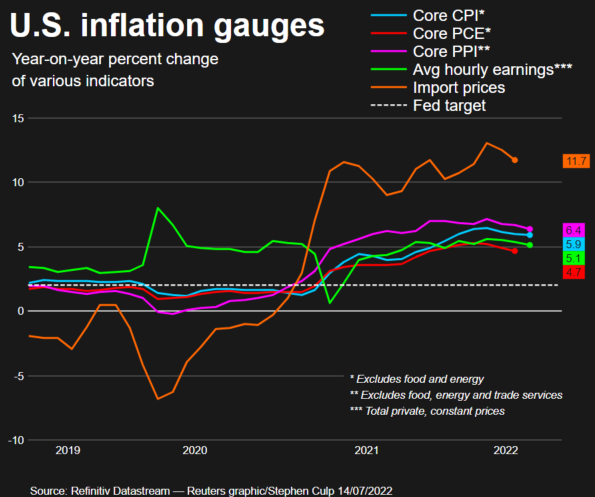Wall St Mixed After Dismal Bank Earnings, Hot Inflation Data

Wall Street stocks pared early losses on Thursday as disappointing quarterly results from two large U.S. banks and hotter-than-expected inflation data prompted a spike in recession fears.
All three major U.S. stock indexes started sharply lower in the wake of second-quarter earnings from JPMorgan Chase & Co and Morgan Stanley. Both reported slumping profits and warned of impending economic slowdown.
Losses narrowed as the session wore on, with a gain in semiconductors helping lift the Nasdaq Composite Index into positive territory.
"The inflation report is concerning, we had bad earnings from financials," said Oliver Pursche, senior vice president at Wealthspire Advisors, in New York. "What's interesting is over the last few sessions we've started at the low point and spend the day rallying back, which from a technical perspective would seem to indicate we're closer to a bottom than not."
JPMorgan Chief Executive Jamie Dimon struck a cautious note on the global economy while Morgan Stanley's investment banking unit struggled to cope with a slump in global dealmaking.
Shares of JPMorgan Chase and Morgan Stanley fell 3.7% and 0.4%, respectively, while the S&P Banks index dropped 2.4%.
Slowdown worries were exacerbated as the Labor Department's Producer Price Index report echoed Wednesday's Consumer Price Index data, showing hotter-than-expected inflation in June.
The sell-off began to ease after Fed Governor Christopher Waller said he supported another 75 basis point interest rate increase in July, easing jitters over an even bigger, 100 basis point hike.
On Wednesday, the odds of a larger hike grew after the CPI report, considering the central bank's intention to aggressively tackle decades-high inflation - a prospect which increases chances of an economic contraction.
"There will be a recession but a mild one," Pursche added. "The key component is continued strength in the labor market. Given where we are in the employment picture, that's not an immediate threat."
Core inflation, which strips out food and energy prices, continues to ease from the March peak, although it remains well above the central bank's average annual 2% target:
(Graphic: Inflation:

)
At 2:42 p.m. ET, the Dow Jones Industrial Average fell 140.11 points, or 0.46%, to 30,632.68, the S&P 500 lost 10.65 points, or 0.28%, at 3,791.13 and the Nasdaq Composite added 22.68 points, or 0.2%, at 11,270.26.
Among the 11 major sectors of the S&P 500, all but tech were in the red, with energy shares posting the largest percentage loss.
Second-quarter earnings season is officially underway, with JPMorgan and Morgan Stanley starting it off on a dour note.
Analysts now expect aggregate S&P 500 second-quarter earnings growth of 5.1%, significantly less than the 6.8% annual growth estimate at the beginning of the quarter, according to Refinitiv.
U.S.-listed shares of Taiwan Semiconductor Manufacturing rose 3.0% following the chipmaker's upbeat revenue guidance.
Conagra Brands tumbled 7.6% after issuing an annual earnings forecast that came in below estimates.
Declining issues outnumbered advancers on the NYSE by a 5.16-to-1 ratio; on Nasdaq, a 2.68-to-1 ratio favored decliners.
The S&P 500 posted one new 52-week high and 44 new lows; the Nasdaq Composite recorded five new highs and 279 new lows.
© Copyright Thomson Reuters 2024. All rights reserved.



















